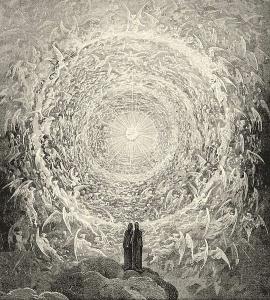
When Scripture talks about heaven, or the heavens, it is hard to deny that many such passages are cosmological, not theological, and they follow an ancient cosmological understanding of the visible sky and what was believed to be in it as well as what could be found beyond it. Many early Christians, therefore, could and would engage that cosmology in their writings, such as when St. Gregory of Nyssa wrote:
So, to reveal our thinking more clearly, we shall repeat the sense of what we have said in a concise form: the firmament, which is called heaven, is the boundary of the sensible creation. Beyond it comes the intellectual creation, in which there is neither form nor size nor spatial location nor measure of spacing nor color nor shape nor magnitude nor any of those things that can be observed below heaven. [1]
Nonetheless, even in this passage, we find that Christians considered the physical space of heaven to be contained within a greater reality. That is, they believed that the sensible creation and the “heavens” which was found in it resided in a spiritual (or intellectual) sphere of existence, that is, a spiritual heaven. This was connected to the way they understood the relationship between matter and spirit, where the spirit is understood to be ontologically superior to matter and so helped, in one way or another, shape, influence, or form material existence. As the physical, or sensible, heaven was seen as “above” or “transcend” the earth we live on, heaven was easily employed as a metaphor representing the greater, transcendent reality of the kingdom of God (thus, the kingdom of heaven). Once the metaphor was embraced, heaven could and would be used equivocally, but also, heaven would slowly be engaged more for its spiritual meaning than its physical one. Thus, even if earlier theologians and Christians saw our destiny in heaven to be related to physical space, others quickly used it to describe an eschatological end which transcended space and time. That is, theologically, heaven became, not just a place in the sky (though some Christians have misunderstood the metaphor and assumed that), but rather a state or condition in which one is found to be perfectly in union with God, a union which allows us to receive transcendent, deifying grace, to be constantly made better and better in never-ending theosis. It is a state, moreover, which we can experience, at least in part, in our temporal, earthly existence, which is why many mystics can be said to have experience of various heavens, each which represent one or another transcendent level of experience of God, and God’s glory (and the graces and spiritual awakening which comes from such an experience).
This is how and why we can be said to be meant to become heaven in ourselves. We are to experience the kingdom of heaven, and realize it is the reign of God established in and with and experienced with love. When we silence our minds from all distractions, when we cut ourselves from external influences to meditate and to experience the radiance of God’s love, then, there can be said to be silence in heaven:
For the soul of a righteous person is “heaven,” as the Lord said through the prophet: “Heaven is my throne.” And: “The heavens declare the glory of God.” So then, when the silence of the contemplative life is settled in the mind, there is silence in heaven, because the clamor of earthly activities recedes from thought, so that the soul inclines to the secret internal ear. [2]
We silence ourselves, therefore, in order to listen to and hear what the God, through the Word and Spirit, has for us to learn and experience. We silence ourselves to experience God’s love. In this way, we can understand heaven is not to be seen merely as a place in the sky, something which transcends the earth; rather, heaven, the reign of God, is all around us. Heaven is everywhere present, as God is everywhere present and fills all things. Those who silence all that could get in the way of the experience of the presence of God will be able to perceive the presence of God at work, and engage that presence. They will apprehend God in themselves and perceive themselves to be (with everyone else) the heaven in which God reigns. And so heaven can also be seen as “the essence of supra-sensible things”, and a “door is open in heaven” when those supra-sensible things are apprehended by us:
The essence of supra-sensible things is often signified in Scripture with the title of “heaven.” Therefore, whenever it says that a door was opened in heaven, we understand it according to [our] interpretation as the nature of supra-sensible things, and particularly so whenever one of the saints says that he ascended there. [3]
Paul himself was uncertain how to understand his “ascension” into the heavens; he understood the traditional cosmological sense of the word heaven, and did not want to discount it, however, he also thought there was something different in regards his experience. He realized, whether or not he was physically elevated, he was at least elevated in his mind, and through that inner transformation, he was allowed to perceive more of the supra-essential reality of the kingdom of God. This is what we are all called to experience. We are all called to be lifted up into heaven, to experience, that is, the transcendent reality of the kingdom of God. And, to be sure, this is true for all creation, for, as John Colet explained, the work of Christ is to bring all things to this heavenly experience, to be lifted up and transcend themselves, so that God can be all in all: “One day all will be heaven, and all things truth. Thus, what suddenly fell, has been revealed again in a long order ; and what the creature suddenly demolished, the Creator in a long succession of time is building up again; that he may restore all things in Jesus Christ.” [4] This is what we should mean when we say, “Come, Jesus.” It is a hope for the restoration of all things to be fulfilled, so that all things can be deified, and in this manner, be said to partake of the kingdom of heaven.
[1] St. Gregory of Nyssa, On the Six Days of Creation. Trans. Robin Orton (Washington, DC: CUA Press, 2021), 68.
[2] Anonymous, “Testimonies of Gregory the Great on the Apocalypse,” in Cassiodorus, St. Gregory the Great, and Anonymous Greek Scholia Writings On the Apocalypse. Trans. Francis X. Gumerlock, Mark DelCoglianto, and T.C. Schmidt (Washington, DC: CUA Press, 2022), 62 [From Homilies on Ezekiel 2.2 [14[, 353-365].
[3] Anonymous, “Anonymous Greek Scholia on the Apocalypse ,” in Cassiodorus, St. Gregory the Great, and Anonymous Greek Scholia Writings On the Apocalypse. Trans. Francis X. Gumerlock, Mark DelCoglianto, and T.C. Schmidt (Washington, DC: CUA Press, 2022), 126 [25].
[4] John Colet, “Celestial Hierarchy” in Two Treatises on the Hierarchies of Dionysius. Trans. Joseph Hirst Lupton (London: Chiswick Press, 1869), 104.
Stay in touch! Like A Little Bit of Nothing on Facebook.
If you liked what you read, please consider sharing it with your friends and family!
















